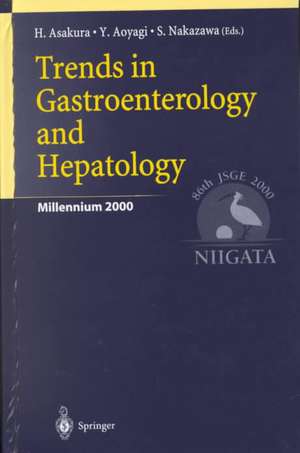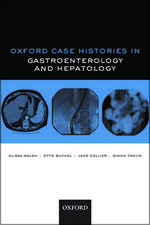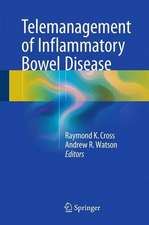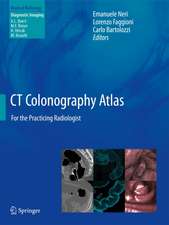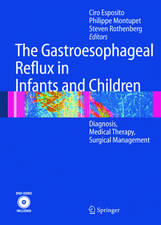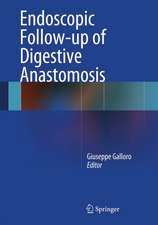Trends in Gastroenterology and Hepatology
Editat de H. Asakura, Y. Aoyagi, S. Nakazawaen Limba Engleză Hardback – 30 iun 2001
| Toate formatele și edițiile | Preț | Express |
|---|---|---|
| Paperback (1) | 721.05 lei 6-8 săpt. | |
| Springer – 27 oct 2012 | 721.05 lei 6-8 săpt. | |
| Hardback (1) | 727.97 lei 6-8 săpt. | |
| Springer – 30 iun 2001 | 727.97 lei 6-8 săpt. |
Preț: 727.97 lei
Preț vechi: 766.28 lei
-5% Nou
Puncte Express: 1092
Preț estimativ în valută:
139.29€ • 145.83$ • 115.26£
139.29€ • 145.83$ • 115.26£
Carte tipărită la comandă
Livrare economică 05-19 aprilie
Preluare comenzi: 021 569.72.76
Specificații
ISBN-13: 9784431703020
ISBN-10: 4431703020
Pagini: 392
Ilustrații: XVII, 370 p.
Dimensiuni: 155 x 235 x 27 mm
Greutate: 0.72 kg
Ediția:2001
Editura: Springer
Colecția Springer
Locul publicării:Tokyo, Japan
ISBN-10: 4431703020
Pagini: 392
Ilustrații: XVII, 370 p.
Dimensiuni: 155 x 235 x 27 mm
Greutate: 0.72 kg
Ediția:2001
Editura: Springer
Colecția Springer
Locul publicării:Tokyo, Japan
Public țintă
ResearchDescriere
Recent advances in gastroenterology and hepatology as well as new findings in biliary and pancreatic diseases are presented in the proceedings of the 86th annual congress of the Japanese Society of Gastroenterology. From the hundreds of papers delivered at the congress, 70 were selected for inclusion here. Opening with special lectures on gastroenterology in the new millennium, ulcerative colitis-pathophysiology and therapy, and life style-related diseases and gastroenterology, the volume is divided into sections reflecting the major concerns of researchers in the science of digestive diseases in Japan today: apoptosis in digestive organs, nitric oxide, transcription factors in digestive organs, antigen-presenting cells, pathology of inflammatory bowel disease, NSAID-induced gastric lesions, microcirculation in digestive diseases, hepatic regeneration, and hepatic fibrosis.
Cuprins
1 Gastroenterology and the New Millennium.- Reflecting Forward: Gastroenterology in the New Millennium.- 2 Ulcerative Colitis Pathophysiology and Therapy.- Pathophysiology of and New Treatment for Ulcerative Colitis.- 3 Life Style-Related Diseases and Gastroenterology.- New Target of Gastroenterology: Overcoming Life Style-Related Diseases.- 4 Apoptosis in Digestive Organs.- Examination of Cytotoxic T Lymphocyte-Mediated Apoptosis Pathway in Peptic Ulcer Formation with or without H. pylori Infection.- Epidermal Growth Factor Inhibits Helicobacter pylori Lipopolysaccharide-Induced Apoptosis of Primary Cultures of Gastric Pit Cells.- Impaired Sensitivity to Fas-Induced Apoptosis of Lymphocytes in Ulcerative Colitis Lesions.- Tumor Necrosis Factor ?-Induced Hepatic Apoptosis and Hepatocyte Sensitization.- Molecular Mechanisms of D-Galactosamine/Lipopolysaccharide-Induced Fulminant Hepatic Failure in Mice and the Effects of Therapeutic Agents.- Ethanol-Induced Apoptosis Mediated by Mitochondrial Permeability Transition in Primary Cultured Sinusoidal Endothelial Cells.- Therapeutic Strategies for Hepatocellular Carcinoma Based on Analyses for Resistance to Apoptosis Mediated by Activation of Intracellular Signal Pathways.- Expression of Apoptosis-Related Factors in Human Pancreatic Duct Cell Carcinoma and Intraductal Papillary-Mucinous Tumor.- 5 Is Nitric Oxide Friend or Foe?.- Effect of Exogenous and Endogenous Nitric Oxide on Endothelial Permeability Induced by Oxidants In Vitro.- Gastric Carcinoma and Helicobacter pylori Infection: Role of Nitric Oxide and Inflammatory Cytokines in Gastric Carcinogenesis.- Does Cyclooxygenase-2 Down-Regulate Gastric Inflammation?.- Regulation of Mucin Synthesis by Neuronal Nitric Oxide Synthase in Gastric Pit Cells.- Role of Nitric Oxide and Capsaicin-Sensitive Sensory Nerves in Gastric Receptive Relaxation and Adaptive Relaxation in Isolated Stomachs of Guinea Pigs.- Role of Inducible Nitric Oxide Synthase in Murine Colitis.- Role of Nitric Oxide in the Progression of Severe Acute Pancreatitis.- Role of Nitric Oxide in the Progression of Acute Pancreatitis.- Protective Effect of Nitric Oxide on Acute Liver Failure in Rats.- Regulatory Mechanism of Cationic Amino Acid Transporters in Hepatic Sinusoidal Ito Cells.- 6 Transcription Factors in Digestive Organs.- Novel NADPH Oxidase, Moxl, Expressed in Cultured Gastric Pit Cells: Modulation of NF-?B Activation.- Role of PPAR? in the Growth and Differentiation of Gastric and Colorectal Cancers.- PPAR? Ligand and Induction of Growth Arrest in Pancreatic Cancer Cells.- Role of ?-Catenin During Early Colorectal and Hepatic Carcinogenesis.- Growth Inhibition of Hepatoma Cells by Type 1 Interferons: Modification by Mutations in the Interferon Regulatory Factor-1 Gene.- Growth Inhibition of Pancreatic Cancer Cell Lines by Ligand Activation of Nuclear Hormone Receptors Through Up-Expression of WAFl/CIPl/p21.- 7 The Role of Antigen-Presenting Cells in Pathophysiology.- Immunopathological Features of Granuloma Formation in the Intestinal Mucosa of Patients with Crohn’s Disease.- Helicobacter pylori and N-Methyl-N’-nitro-N-nitrosoguanidine Induction of Dendritic Cell Infiltration of the Pyloric Mucosa of Mongolian Gerbils.- Cytotoxic Effect of Bone Marrow-Derived Dendritic Cells.- Autoimmune Mechanisms of Cancer-Associated Paraneoplastic Syndromes: A Review.- Antitumor Activity Against Gastrointestinal and Hepatocellular Carcinoma Induced by Immunization with Fusion of Dendritic and Carcinoma Cells in Mice.- 8 The Pathophysiology of Inflammatory Bowel Disease.- Essential Role for Interleukin-6 in the Pathogenesis of Crohn’s Disease.- Activation of Nuclear Factor ?B in Dextran Sulfate Sodium-Induced Colitis in Mice and Their Inhibition by Phenyl N-tert-Butylnitrone.- Essential Roles for Th2-Type Responses in Chronic Intestinal Inflammation.- Induction of Colitis and Exocrinopathy in Nude Mice Induced by Immunocompetent Cell Transfer from Murine Retrovirus-Infected Mice.- Potential Role of Mucosal Addressin Cell Adhesion Molecule-1 in Inflammatory Bowel Diseases.- Anti-Saccharmomyces cerevisiae Antibody in Inflammatory Bowel Disease.- Reactive Oxygen Species and Colonic Epithelial Cell Apoptosis in Ulcerative Colitis.- 9 NSAID-lnduced Gastric Lesions.- Effect of Antiulcer Drugs for Treatment of Nonsteroidal Antiinflammatory Drug-Induced Ulcers.- Role of Intravascular Neutrophils in the Pathogenesis of Aspirin-Induced Gastric Mucosal Injury.- Mucin Secretion Evoked by Prostaglandin E2 in Guinea Pig Antral Mucous Cells: Role of EP1/EP4 Receptors.- Effects of Indomethacin and NS-398 on Acid-Induced E-Cadherin Surface Expression in Rat Gastric Epithelial Cells.- Roles of Reactive Nitrogen Species in Helicobacter-Related Carcinogenesis.- Interaction Between Helicobacter pylori Infection and NSAID Use.- Interrelations of Nonsteroidal Antiinflammatory Drugs, H. pylori Infection, and Gastric Damage.- 10 Prevention of Disease by Modulation of Microcirculation.- Microvascular Leukocyte Activation and Apoptosis in Helicobacter pylori-Colonized Gastric Mucosa.- Alteration of Gastric Microcirculatory Architecture During Healing of Acetic Acid-Induced Ulcer and Helicobacter pylori Infection.- Cyclooxygenase and Colon Cancer.- Contribution of Colon Cancer Cells to Mesenchymal Cells in the Formation of Hepatic Metastasis.- Hepatic Microcirculation in Massive Liver Necrosis and Liver Regeneration.- Prevention of Hepatic Ischemia/Reperfusion Injury by Microcirculatory Regulation: Application to Liver Transplantation.- Genetic Manipulation of Sinusoidal Endothelial Cells.- Controlling Tumor Microenvironment by the Antiangiogenesis Strategy.- Pancreatic Blood Flow in Chronic Alcoholic Pancreatitis.- 11 Hepatic Regeneration Update.- The Role of Hepatic Oval Cells in Hepatic Regeneration: Possible Clinical Applications.- Hepatoma-Derived Growth Factor: Involvement in Liver Development and Regeneration.- Tumor Necrosis Factor and Liver Regeneration.- Heparin-Binding EGF-Like Growth Factor: Hepatotrophic Factor in Liver Regeneration.- Effects of Growth Stimulatory and Inhibitory Factors on Signal Transduction of Cultured Rat Hepatocyte and the Regulation of Cyclin D1 Transcription.- Significance of the Relation Between Hepatocyte Growth Factor and Transforming Growth Factor-? in Hepatocyte Proliferation.- 12 Hepatic Fibrosis Research and Its Application to Therapy.- Transcriptional Regulation of Type I Collagen Gene Expression by Transforming Growth Factor-? and Smad Proteins.- Clinical Usefulness of Plasma MMP-9 Assay Compared with the Plasma MMP-2 Assay in Patients with Chronic Liver Disease.- Molecular Mechanisms of Matrix Metalloproteinase-1 Gene Expression in Hepatic Stellate Cells.- Molecular Analysis of Stellate Cells Activation by Proteomics.- Tissue Inhibitor of Metalloproteinase-1: Strong Promotion of Liver Fibrosis Development in the Transgenic Mouse Model.- Antioxidant and Antiapoptotic Activities of a Tissue-Specific Selective Estrogen Receptor Modulator, Idoxifene, in Rat Fibrotic Liver and Cultured Rat Hepatocytes.- Blockade of TGF? Signaling: Prevention of Fibrosis/Dysfunction and Enhancement of Hepatocyte Regeneration in Injured Liver.- Protease Inhibitors: Suppression of Activation of Hepatic Stellate Cells by Inhibiting TGF? Generation.- Plasma Transforming Growth Factor-?1: A Useful Marker for Hepatic Fibrosis in Chronic Hepatitis C.- Key Word Index.
Caracteristici
Provides readers with the most recent progress in the basic science of gastroenterology, hepatology, biliary and pancreatic diseases
